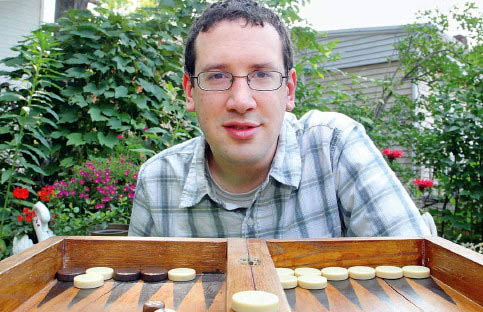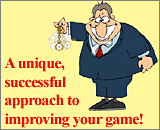
|
In a short time Frank Raposa has become a rising star on the American Backgammon Tour. With several wins already under his belt, here we get some information on his background and the secrets to his success.
|

|
|
Please tell us a little about yourself — about your family, where you live, your schooling, and what you do professionally.
|
I grew up in Fitchburg, Massachusetts to a great family. It was a unique situation, with several members of my extended family living in the different apartments of our building. At times it was like being raised by the Golden Girls, but I wouldn't have traded it for anything.
I was a good student and stayed out of trouble for the most part and I was accepted at Clark University where I pursued a liberal arts degree.
Fitchburg is kind of a post-industrial city, as many places are these days, so I headed to Washington, DC after I graduated college looking for work. I have "VA" next to my name in backgammon posting but my heart will always be in New England.
I have been working at the Pan American Health Organization, which is the Latin American branch of the WHO, for seven years now. It started out as a temporary assignment, and has since turned into a solid gig. I'm in the Unit of Medicines and Health Technologies providing administrative support to health projects focused on medicine and vaccine distribution as well as disease eradication. It's a little heavy on paper shuffling, but I'm extremely grateful to my company for the trust they've given me, and I like to think that I'm doing some good for the world in my own small way.
|
How have you become such a good player so quickly? What do you do on a regular basis to improve your game?
|
Backgammon for me became a significant pastime when I stumbled on the Northern Virginia Backgammon Club back in 2007. It was held at this bar I had visited a few times. I was quite surprised to find out that organized backgammon was going on, because I had no idea that tournaments existed prior to that. Everyone was glad to give me pointers and show me the ropes.
I started practicing on a board I made out of a Cheerios box and was starting to see that there was something much deeper to this game. Since then backgammon is something that I've never gotten sick of. There are several solid players in the DC area, and I definitely credit my recent success to that environment.
 Frank Raposa, pictured in a Sentinel and Enterprise article from 2014.
Frank Raposa, pictured in a Sentinel and Enterprise article from 2014.
I have taken a look at most of the major backgammon publications released in the last 15 years or so. Chances are that if someone has made a written contribution to this game I have benefitted from it. People have commented on what they consider to be an adequate study-to-play time ratio. I used to be at 10-to-1 study-to-play, but these days that ratio has about completely flipped.
I use XG on a regular basis to play practice matches and analyze individual positions. As opposed to recording an entire live match, I'd rather just take pictures of individual positions to plug into XG. I don't need to see that I'm playing at PR of zero after I play my opening 3-1 correctly. Basically I've put forth a lot of time to the game, and I'm always ready to roll.
|
How many hours a week do you play or study backgammon?
|
If I answer that, my friends might stage an intervention. Let's just say it's "sufficient".
|
And you are directing the Northern Virginia local club now?
|
Yes. I took over directing duties a few years ago because I had the most consistent weekly attendance due to my instant backgammon addiction. As a local director, I place high emphasis on proper etiquette and the self-regulating nature of the game, mainly because I dread making rulings and getting involved in disputes.
|
Do you play on line? If so, where and how often?
|
Very rarely. I used to play on Yahoo as a way to procrastinate doing schoolwork when I was younger, but online play really doesn't compare to live play for me. I'm lucky because there is so much live action in the DC area that I only need to resort to online play for an occasional team tournament. Even though I don't play much online, thank goodness for the internet. With technology, there are pretty much no barriers from being able to enjoy backgammon. It isn't like yachting or polo where only a select few can participate.
|
Will you share with us a huge blunder you have made in a tournament? Why do you think you made that error?
|
I'm entertained by high volatility plays like desperation banana splits and action cubes as an underdog. So I often get a little over-eager about making these plays when they're not necessary. But that's ok because I believe, in backgammon, it's better to err on the side of aggressiveness, especially with the cube. Nobody has ever won a tournament by being passive.
Another source of my errors has been trying to apply new concepts as soon as I learn them. I feel that the key is to not try to immediately apply fresh ideas, but rather be ready to apply those skills when the situation arises naturally.
In my opinion backgammon is not like most other games and sports where you have a high level of freedom and creativity to choose your game plan starting from a blank canvas. For the most part, the dice determine your "canvas", and then you should work within that framework thematically. (I love that word "thematic." It's one of those backgammon terms players can remember when dealing with the outside world).
|
What are your greatest tournament results and backgammon accomplishments?
|
I've been fortunate to have some nice cashes over the last couple of years, and my favorite was last year's Memorial Day tournament in Chicago. That tournament probably taught me the most valuable lesson I've learned recently, which is not to be scared of a tough field. That event happened to host the Giants Invitational, so it was the equivalent field of a backgammon all-star game.
If a tournament brochure advertises that good players will be in attendance, I hope that people's first reaction is not that this is bad for their equity, but rather that it is an opportunity to take advantage of. And you might get lucky on top of it.
Everyone who I've approached for commentary and opinions has been extremely generous with their information, and playing with good players is the best way to improve rapidly. Yeah you might lose a few dollars in the process, but XG is no replacement for over-the-board experience. It seems like the draws at these tournaments keep getting tougher, but how you play is definitely more important than who you play.
|
When you are at a backgammon tournament, what do you do between matches? Do you study? Do you relax?
|
Part of what I love about ABT tournaments is that I can treat them like a mini weekend vacation. It's fun to hop on a plane after work, head somewhere and just be totally immersed in backgammon for a few days. Occasionally I'll do some sightseeing or have a nice meal, but if that doesn't fit into my schedule so be it.
I don't study at tournaments because I don't believe that a backgammon match is like a university exam that you can cram for. When a tricky decision comes up over the board it's very unlikely that an additional couple of minutes of studying would help your chances. Sometimes I'll have a Robertie or Woolsey book in my bag, but that's mainly to kill time on the plane.
I try to attend most lectures if I am awake in time. If I'm still alive in an event I'll try to have a professional, focused approach to the tournament, but once I get knocked out I'll grab a beer, join a chouette and not care too much about sleep. I don't know how long I can keep up my current attendance pace, but I'm sure enjoying it while it lasts.
|
What is the significance of the shark on your board?
|
I just wanted something fun and unique to show that I'm a serious player. So far nobody has gotten overly terrified of the shark symbol on my board. Personally I'd be more wary about playing someone who had a board worth several grand! I am definitely not a shark in the money sense, and actually spend quite a bit of time in $3 chouettes. I am a strong advocate of tournaments with low entry fees, especially at the local level.
|
When you get to a complicated cube decision, do you do all the math to figure out what your gammon-adjusted take point is, or do you rely more on your instincts, experience, and references?
|
I am not a numbers person at all, and I treat backgammon as much more of an art than a science. I'll do pip counts, count some shots, and I have a few of the take points memorized, but that's about it. I generally know if my take point is high or low, and if my recube vig is big or small, but I would find it very distracting to try to get the numbers exact over board.
I realize that the look-and-feel approach can only get you so far. To take my game to the next level I know that I would need to bite the bullet and focus more on the numbers, but I've yet to do so because I just don't find that it's an enjoyable aspect of the game.
Anyone who has played me in more than a few matches knows that my biggest weakness is bearoff cubes in short races. In those positions, look and feel is almost useless. If you make one slight adjustment in adding a pip or filling in a gap, a position could go from being a blunder to cube to being a blunder to take. So in those positions I honestly just try to guess correctly, the same as mostly all players do. Anyways, the conceptual aspects of the game just interest me a lot more.
|
What advice do you have for a relative beginner to learn the game well?
|
Become proficient at the fundamentals. I feel like there are about a dozen or so core concepts of backgammon that anyone could learn in a week or so. You could spend a lifetime branching out into more complicated variations of the basics, but having a cursory understanding of the fundamentals is sufficient in order to be able to enjoy the game. Don't stress out too much if you don't understand the wacky once-in-a-lifetime positions, unless you really enjoy twisting your mind in a knot.
In the beginning, accept all advice up until the point where you can gauge the quality of the advice, then be more selective about who you listen to. And don't be defensive. If someone tells you not to play your opening 3-2 by going 13-8, it's not because they're trying to show you up, it's because they want you to be able to play in a way that you'll enjoy the game more by playing with some flexibility and thinking at a deeper level.
|
Who are your heroes in backgammon, people you really respect for the play or their contributions to the game?
|
"Hero" is a strong word, but there are many people that I admire for their effort and dedication. In particular, I love the directors. Without them there's nothing.
Carol Joy Cole is the cream of the crop. Bill Riles has put forth great energy and effort. I compare his preparation for the Texas tournament to Santa Clause preparing for Christmas! And I'm also a fan of Jeb's running of Charlotte tournament. I like the way that he has offered staggered entry fee options. There should be more free or reduced-entry opportunities to help democratize the game.
|
What is your favorite tournament format — Swiss, single-elimination, dual-duel, etc.?
|
Swiss tournaments are fun because you get to play a lot of matches and you can coordinate breaks, as the starting times are clearly posted. Also, I like the fact that I can take a scary 8-cube if I think it's a proper take, and know that if I lose I'm not completely dead because of one bad dice sequence.
In a single elimination event you are walking on thin ice the whole time. The Swiss tournaments usually require a long weekend, so maybe I'm just happier at those times because I get a longer vacation.
All in all, I'm not too picky about format, clocks, or the legal-moves debate. Although I strongly think that "legal moves" is best at the local/beginner level. Backgammon is backgammon, and I enjoy every tournament format.
|
What do you think needs to be done to help grow the game and make it more popular around the world?
|
I'm sure exposure and added money would help. It's tough to tell when any game or activity is ready for a boom, but I'd like to think that backgammon has potential. If someone wants to step up and be the Howard Hughes of backgammon, great. If not, I'll still enjoy backgammon as a quaint activity.
|
Do you read the latest articles on line and in backgammon publications?
|
I think there is a general tendency for people to flock to what's new. I'd rather reread a high quality article from five years ago than a new article or book that may or may not be helpful to me. Chances are that if something is worth reading I'll get to it eventually and go over it a few times.
I don't feel like I'll be left behind if I don't get to read something the minute it becomes available. Anyone who has XG already has an infinite amount of information at their fingertips, so we've already all bitten off more than we can chew in a sense. It reminds me of that Nate Silver quote: "We need to expect more from ourselves than we do from our data."
|
When you have a particularly unlucky streak and the dice seem to clearly be going bad for you, what are your thoughts? How do you handle it?
|
I'm not superstitious, and we all know the dice have no memory. I don't see any particular need to address an "unlucky" streak. If it's a streak when I'm playing poorly then that's something deal with, either by study or getting into a better focus.
|
What interests and hobbies do you have outside of backgammon?
|
I'm an avid New England sports fan, which rivals my interest of backgammon. The 2004 Red Sox season may have taken a few years off my lifespan but the tear-gas was worth it.
Recently I've gotten into reading on topics on behavioral economics and game theory. It's definitely interesting to know the thought processes that make the world turn. I'm playing around in the stock market a little, mainly as a gambling pastime.
I've dabbled around in some other games on occasion. I won a cribbage tournament at the local American Legion last year. The end-game strategy of cribbage is the closest thing to a transferable skill from backgammon match play that I've found.
|
Do you have a particular philosophy of life?
|
I just try to keep things balanced and in perspective. Nothing too tricky. I'm usually a very lazy person; if left to my own wits I might get up at noon every day in time for Maury Povich. One of the benefits of being lazy is that I'm more or less immune to stress and very easy going. I believe that has helped my approach to backgammon.
|
Anything else you care to add?
|
I see a lot of positive things happening in backgammon and believe this game has a bright future. Thanks, Phil, for everything you do for the game.
| 



 Frank Raposa, pictured in a Sentinel and Enterprise
Frank Raposa, pictured in a Sentinel and Enterprise